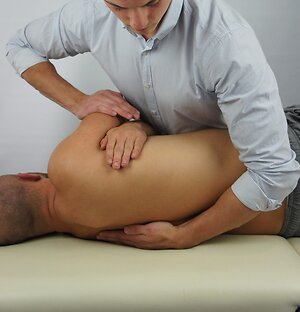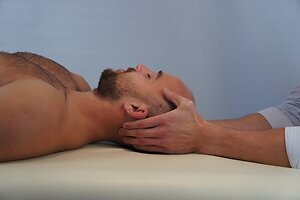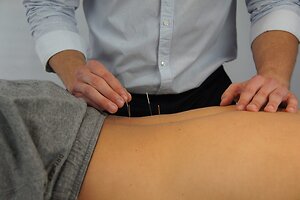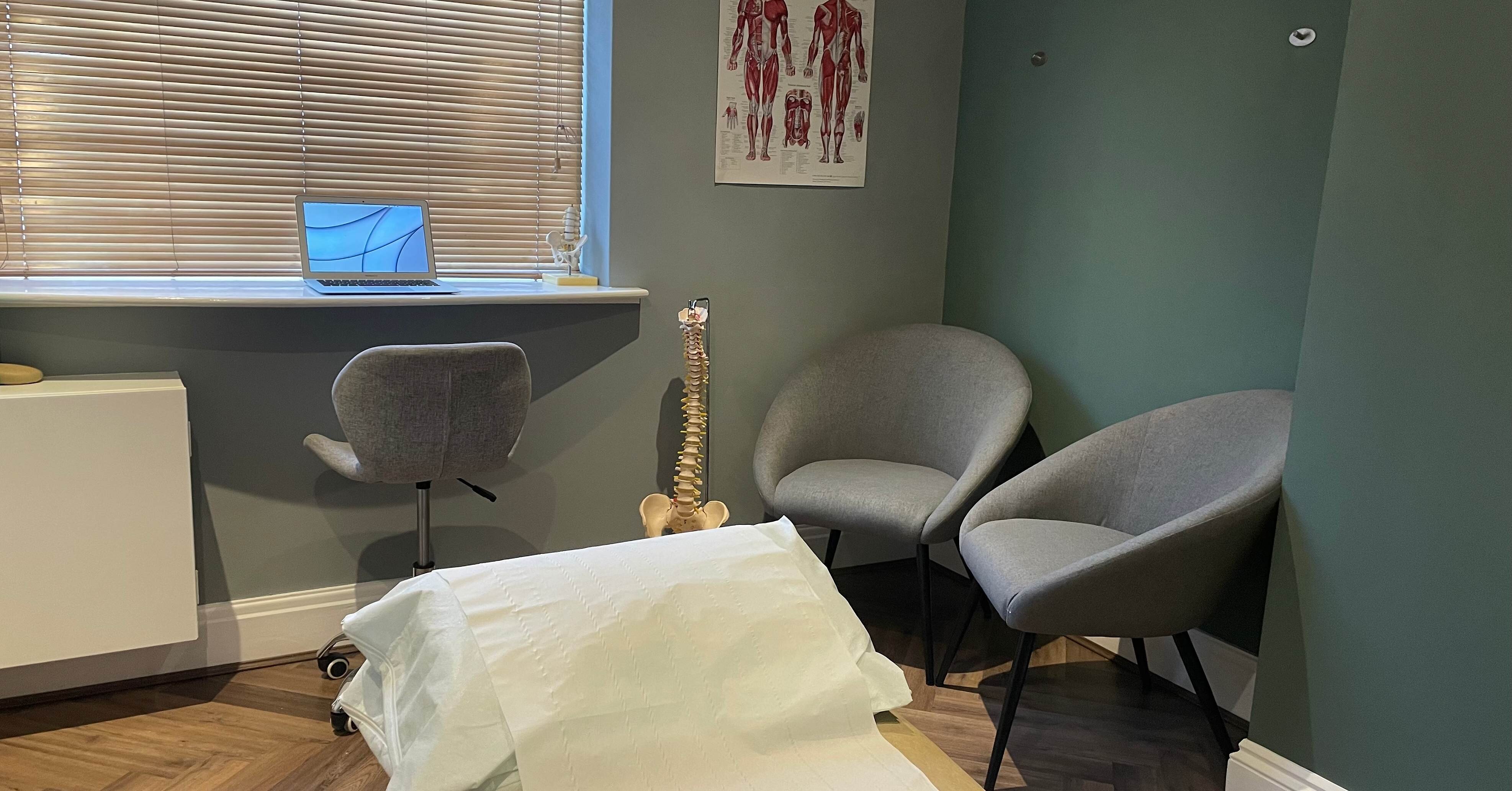Therapies
Welcome to our Therapies page. Here you will find information on the additional Therapies we offer as well as Osteopathy.
Book Online

Osteopathy
Our Osteopaths are highly skilled in their sense of touch (palpation) and they use these skills to observe imbalances and dysfunction in the joints and soft tissue structures of the musculo-skeletal system (muscles, ligaments, capsules, fascia and tendons). Once the inter-relationship of these neighbouring structures is understood, they use a range of highly skilled techniques to treat the patient.
Treatments vary from patient to patient but may include:
- Soft tissue massage
- Joint articulation with varying degrees of subtlety
- Rhythmic stretching
- Joint manipulation
- High-Velocity-Thrust manipulation (HVT)
- Muscle Energy Technique (MET)
- Exercise prescription
Back Ache
Sciatica
Arthritic Pain
Muscle Spasm
Muscle Tension
Joint Pain
Migraine Prevention
(Cervicogenic) Headaches
Hip Pain and Knee Pain from Osteoarthritis
Shoulder Pain
Sports Injury
Frozen Shoulder
Elbow Pain
Tennis/ Golfer's Elbow
Neuralgia
Fibromyalgia
Digestive problems
To Aid Relaxation
For more information, visit our Osteopathy page here.

Cranial Osteopathy
Cranial osteopathy is not different to osteopathy, it is the name given to a subtle and refined approach to osteopathy that follows all the principles of osteopathy, but that includes the anatomy and physiology of the head.
Cranial osteopaths use a highly trained sense of touch to feel subtle changes of tension and tissue quality in the living anatomy of the whole body, and to diagnose areas of strain or dysfunction.
Through palpation, the osteopath is often drawn to areas in the body that have been affected by past events, such as old accidents and injuries. The body may have learned to compensate for a traumatic event or injury and the patient may be unaware that there is anything wrong, but the effects may still be present and relevant to current symptoms.
Joanna is a Fellow of the Sutherland Cranial College of Osteopathy (SCCO), having completed nine modules of the post-graduate cranial osteopathic pathway. She also teaches on the SCCO Paediatric Osteopathy Diploma. She was awarded the Diploma in 2016.
What patients and conditions can cranial osteopathy help?
This approach to osteopathy is a way of viewing the body rather than a type of technique and it can be used on every patient – we treat people not conditions. Cranial osteopathy is widely known for the treatment of babies but is equally effective for children, adults and the elderly. In any osteopathic treatment, the whole body is involved and improvements are often noted in different areas and different systems than just the symptomatic one.
For more information, please visit the SCCO website where there is lots of information about the history and philosophy of cranial osteopathy.

Acupuncture
Acupuncture sessions at Easingwold Osteopaths are provided by our dedicated, experienced acupuncturist, Nicola Rawstron. If you are interested in acupuncture but not sure whether it’s the right choice for you then contact us for a chat or to book a free consultation.
Nicola works on the basis of treating each person as an individual, not a list of conditions, and as such we would prefer to meet you to discuss your specific problems, rather than making general claims as to what acupuncture may or may not be able to help with. If acupuncture is not the right choice, Nicola can help refer you to the relevant therapist or health professional.
Sometimes people are discouraged from trying acupuncture because of the use of needles, however acupuncture needles are incredibly fine and the process shouldn’t be painful at all. Most people feel calm and relaxed during treatment, and may fall asleep. If you are unsure about needles then you are welcome to try a single needle during your consultation to see how it feels!
For people who really don’t like needles at all, it may be possible to gain many of the benefits of acupuncture using light touch to the acupuncture points. This is called acupressure.
Acupuncture provides a means for you to become active in your own health and wellbeing, and is a simple cost-effective and safe treatment which helps many people worldwide.
What happens during treatment?
Acupuncture is part of a system of healthcare known as Traditional Chinese Medicine which is widely used and well researched internationally. You may have seen articles on acupuncture in the media and are wondering if it would be helpful for you, or have had a friend, relative or a medical professional suggest you try it. It has recently become more widely accepted by many Doctors as a useful complement to conventional medicine
Your first appointment for acupuncture may involve some detailed questioning about your health and aspects of your lifestyle.
Follow-up treatments and a personal plan will be discussed with you. This may include advice concerning diet, exercise, use of other resources, referral to other practitioners, and an agreed number and frequency of visits for acupuncture.
Treatment involves inserting very fine needles at specific points on the body. These are usually painless but if you are particularly averse to the thought of needles, acupressure (where pressure is applied to the points with the fingers or hands) can be used instead.
Treatment may also involve the use of massage, moxibustion (a warming treatment using smouldering herbs) and cupping (where suction cups are applied to the body).
Most people feel deeply relaxed during treatment. Some patients may feel a mild ache or tingling sensation when the needles are inserted. They will be left in place for about twenty minutes. It is common for patients to feel very relaxed so it is advisable to avoid strenuous exercise immediately after treatment.
The number of treatments you will need will vary from person to person and will be discussed with you at your first appointment.
If you are receiving treatment from your doctor then it makes sense to tell him or her about your plans to have acupuncture – most GPs are open to the idea of their patients receiving acupuncture. You should always tell your acupuncturist about any medication you are taking as this may affect your response to acupuncture treatment.
How much will it cost?
Treatments are £47.00 per session. Each session lasts around 40-45 minutes
Massage Therapy
Massage has been used for centuries as a way of aiding relaxation, helping with sleep, as well as relieving anxiety and stress. It is usually a safe therapy for all age groups.
Relaxation Massage
This helps to promote deep relaxation and a sense of calm and relieves anxiety and stress.
Massage signals the brain to release ‘endorphins’ – the chemicals which give us the feelings of wellbeing and are also our natural painkillers. Endorphins reduce the amount of stress hormones (adrenalin and cortisol) that we make – high levels of which these hormones have been shown toslow healing and impair the immune system.
Lymphatic drainage techniques are particularly helpful for releasing tension.
Therapeutic/ Remedial Massage
This style of massage involves working with tissues on a variety of levels and is often used after injury or strain, but can also be used on a regular basis to “maintain” well being. Remedial massage may reduce stress induced muscle tensions.
During treatment we may work on specific ‘trigger points’ where an area of contracted muscle refers pain to a distant area.
This style of massage is an excellent way of helping to ease musculoskeletal problems.
Sports Massage/ Deep Tissue
These types of massage may benefit people participating in sports and regular exercise and those working in demanding physical jobs.
Treatments vary from back and shoulder work, to deep tissue and muscle work of the legs for runners or people playing sport regularly.
These massages may aid the bodies own natural lymph circulation which eliminates toxins and transports nutrients to the cells.
Back, Neck & Shoulder Treatments
Various levels of pain and sometimes loss of mobility can be caused by problems arising from the head, neck and shoulder areas.
Problems may be caused by stress, injury, posture and other lifestyle factors.
Many of our pains and strains are caused by routine activities such as desk and computer based work, repetitive strains from driving, or even awkward sleeping positions.
As a lot of tension is carried in the neck, shoulders and chest, this massage focuses on opening up the chest, relaxing the shoulders and relieving tensions in the back. This treatment combines a number of stretching and passive movements, guiding the joints gently.

Nutritional Therapy
When can Nutritional Therapy be helpful?
• Nutrition for sport and exercise - Timing of meals and snacks when exercising, and advice on how to fuel your body to get the most from your efforts
• During pregnancy, postpartum or breastfeeding
• Gut health – the microbiome – and balancing fibre intake
• Mental health and nutrition – Mind mood and food
• Nutrition for children
• Understanding food labelling
• Meal planning
• Optimising nutrition without supplements
• Menopause
• Older adults
• Convalescence after illness
INITIAL CONSULTATION/ASSESSMENT
Prior to your initial consultation Nicola will need to have a quick telephone or email pre-appointment assessment conversation with you.
Following this conversation you may be required to fill out a food diary, usually over 3 days. If this is necessary, it will be requested during your phone conversation with Nicola and you should bring this along to your first appointment or email it to Nicola prior to your appointment.
Nicola will need to ask detailed questions about your nutritional objectives and any barriers to making progress. She will also ask about your medical history, general health and any medication you may be taking. Please bring a copy of any current medication or supplements you may be taking. It would also be very helpful if you have results of any blood tests, investigations or medical procedures you may have had.
Your initial assessment may take up to an hour and a half but this will vary from person to person. Brief recommendations may be given at this appointment, but a more detailed analysis and a personalised plan or guidance will be provided at your follow up appointment. If Nicola does not feel you will benefit from treatment she will explain why. You are welcome to have a friend or relative with you during the consultation if you wish. If you are under 18 we do require a parent/guardian to be with you.
FOLLOW UP APPOINTMENT
Follow up appointments are around 30-45 minutes in length and will be booked, if required, at the end of your initial assessment. Payment will be taken in advance for this appointment which will likely be a few weeks after your initial assessment.
At this appointment a more detailed and personalised plan will be discussed with you. Your feedback at this stage is important to make sure that any recommendations seem achievable for you.
MAINTENANCE
A further follow up appointment or call will be scheduled if appropriate and as required on an individual basis.
How much does it cost?
Your initial consultation appointment will last 1-1.5 hours and costs £75.00. Follow-up & Maintenance visits are 30-45mins and cost £45.00

